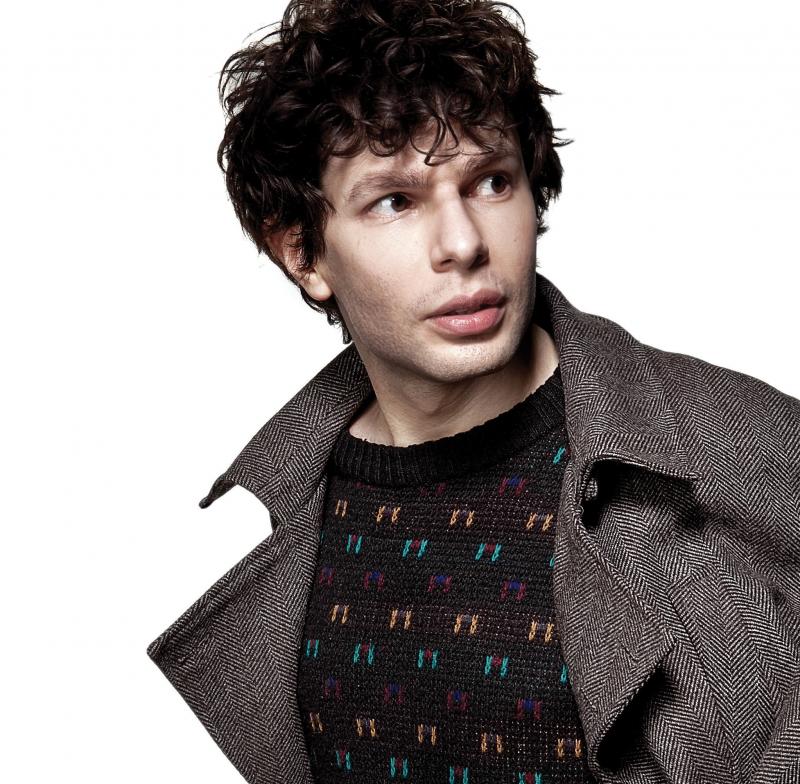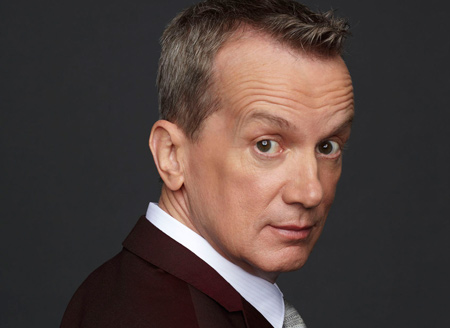Imagine: The Art of Stand-up, BBC One | reviews, news & interviews
Imagine: The Art of Stand-up, BBC One
Imagine: The Art of Stand-up, BBC One
A documentary stuffed full of comic talent which tried to cover too much material

What makes something funny? Why do comics stand on stage in front of strangers and try to make them laugh? Is any subject beyond a joke? What is the purpose of Alan Yentob? Those questions – OK, only the first three – were raised by Imagine's presenter in this, the first of a two-parter about the art of stand-up.
The documentary about comedy on this side of the pond (tonight's second part is about American stand-up) was stuffed full of comic talent – so full, indeed, that we saw unusually little of the presenter, although he still managed to shoehorn himself unnecessarily often into the programme, as is his wont. Luminaries of the comedy craft, including Billy Connolly, Frank Skinner, Dara Ó Bríain, Omid Djalili, Ed Byrne and, er, Jim Davidson gave their thoughts about their job, while clips of other comics, including Jimmy Carr, Frankie Boyle and the late, great Max Miller were used to illustrate numerous sections, given headings including “Beginnings”, “The art of jokes”, "the art of causing offence" and “The crowd”.
The section on hecklers threw up incredibly divergent views but lasted about two minutes
So many people being interviewed for such a wide range of subjects made for a frustrating programme - big on contributors, short on import - even if the opening section, with quotes about why comics do stand-up, promised revelation. “It's like being able to fly,” said Jack Dee, “You can say anything you want,” said Simon Amstell, while Andi Osho, I suspect, came closest to explaining the buzz for performers: “I've heard it referred to 'the joke coke',” she said. As Ó Bríain added, as soon as he comes off stage he wants to go straight back on.
But while Yentob later talked revealingly with Amstell about comedy as therapy, one felt short-changed throughout because some terrifically interesting material was not being probed as deeply as it demanded. The section on hecklers, for example, threw up incredibly divergent views but lasted about two minutes. Djalili welcomed hecklers and thought they added something to his act, Davidson's advice to young comics was never to engage with them, while Connolly's view was, surprisingly, that hecklers show disrespect.
 I would have liked also to see Boyle and Carr, two of our most deliberately offensive comics, talking about whether there were taboo subjects in stand-up (although I suspect they refused the opportunity to take part, and we simply saw clips of their work). As it was, we got thoughtful contributions from Paul Sinha, Chris Addison and Djalili, but they are stand-ups who know their audiences, how a joke will be heard and, most crucially, the value of irony. As American comic W Kamau Bell noted, “Irony is a very thin material, and rips and tears very easily.”
I would have liked also to see Boyle and Carr, two of our most deliberately offensive comics, talking about whether there were taboo subjects in stand-up (although I suspect they refused the opportunity to take part, and we simply saw clips of their work). As it was, we got thoughtful contributions from Paul Sinha, Chris Addison and Djalili, but they are stand-ups who know their audiences, how a joke will be heard and, most crucially, the value of irony. As American comic W Kamau Bell noted, “Irony is a very thin material, and rips and tears very easily.”
A section I could have done without was about a comedy module on a course at the University of Kent, while the achingly intellectual contribution of Howard Jacobson added little (although he likes Roy 'Chubby' Brown, natch, and would prefer to see Jim Davidson rather than Ben Elton), but there was much to enjoy, including Skinner (pictured above) talking about the gig he did on the night Princess Diana died. “Are you going to do a minute's silence?” the club manager asked. “No, I'll integrate the silence into my act as I always do,” rejoined Skinner. What a shame that so much talent was gathered but had so little time to explain their craft.
- Imagine: The Art of Stand-up, part 2 is on BBC One tonight
Buy
Explore topics
Share this article
Add comment
The future of Arts Journalism
You can stop theartsdesk.com closing!
We urgently need financing to survive. Our fundraising drive has thus far raised £49,000 but we need to reach £100,000 or we will be forced to close. Please contribute here: https://gofund.me/c3f6033d
And if you can forward this information to anyone who might assist, we’d be grateful.

Subscribe to theartsdesk.com
Thank you for continuing to read our work on theartsdesk.com. For unlimited access to every article in its entirety, including our archive of more than 15,000 pieces, we're asking for £5 per month or £40 per year. We feel it's a very good deal, and hope you do too.
To take a subscription now simply click here.
And if you're looking for that extra gift for a friend or family member, why not treat them to a theartsdesk.com gift subscription?
more TV
 Insomnia, Channel 5 review - a chronicle of deaths foretold
Sarah Pinborough's psychological thriller is cluttered but compelling
Insomnia, Channel 5 review - a chronicle of deaths foretold
Sarah Pinborough's psychological thriller is cluttered but compelling
 Live Aid at 40: When Rock'n'Roll Took on the World, BBC Two review - how Bob Geldof led pop's battle against Ethiopian famine
When wackily-dressed pop stars banded together to give a little help to the helpless
Live Aid at 40: When Rock'n'Roll Took on the World, BBC Two review - how Bob Geldof led pop's battle against Ethiopian famine
When wackily-dressed pop stars banded together to give a little help to the helpless
 Hill, Sky Documentaries review - how Damon Hill battled his demons
Alex Holmes's film is both documentary and psychological portrait
Hill, Sky Documentaries review - how Damon Hill battled his demons
Alex Holmes's film is both documentary and psychological portrait
 Outrageous, U&Drama review - skilfully-executed depiction of the notorious Mitford sisters
A crack cast, clever script and smart direction serve this story well
Outrageous, U&Drama review - skilfully-executed depiction of the notorious Mitford sisters
A crack cast, clever script and smart direction serve this story well
 Prost, BBC 4 review - life and times of the driver they called 'The Professor'
Alain Prost liked being world champion so much he did it four times
Prost, BBC 4 review - life and times of the driver they called 'The Professor'
Alain Prost liked being world champion so much he did it four times
 The Buccaneers, Apple TV+, Season 2 review - American adventuresses run riot in Cornwall
Second helping of frothy Edith Wharton adaptation
The Buccaneers, Apple TV+, Season 2 review - American adventuresses run riot in Cornwall
Second helping of frothy Edith Wharton adaptation
 The Gold, Series 2, BBC One review - back on the trail of the Brink's-Mat bandits
Following the money to the Isle of Man, Spain and the Caribbean
The Gold, Series 2, BBC One review - back on the trail of the Brink's-Mat bandits
Following the money to the Isle of Man, Spain and the Caribbean
 Dept. Q, Netflix review - Danish crime thriller finds a new home in Edinburgh
Matthew Goode stars as antisocial detective Carl Morck
Dept. Q, Netflix review - Danish crime thriller finds a new home in Edinburgh
Matthew Goode stars as antisocial detective Carl Morck
 The Rise and Fall of Michelle Mone, BBC Two - boom and bust in the lingerie trade
Life in the fast lane with David Cameron's entrepreneurship tsar
The Rise and Fall of Michelle Mone, BBC Two - boom and bust in the lingerie trade
Life in the fast lane with David Cameron's entrepreneurship tsar
 Code of Silence, ITVX review - inventively presented reality of deaf people's experience
Rose Ayling-Ellis maps out her muffled world in a so-so heist caper
Code of Silence, ITVX review - inventively presented reality of deaf people's experience
Rose Ayling-Ellis maps out her muffled world in a so-so heist caper
 The Bombing of Pan Am 103, BBC One review - new dramatisation of the horrific Lockerbie terror attack
Six-part series focuses on the families and friends of the victims
The Bombing of Pan Am 103, BBC One review - new dramatisation of the horrific Lockerbie terror attack
Six-part series focuses on the families and friends of the victims
 theartsdesk Q&A: Zoë Telford on playing a stressed-out psychiatrist in ITV's 'Malpractice'
She nearly became a dancer, but now she's one of TV's most familiar faces
theartsdesk Q&A: Zoë Telford on playing a stressed-out psychiatrist in ITV's 'Malpractice'
She nearly became a dancer, but now she's one of TV's most familiar faces

Comments
I love comedy but this was